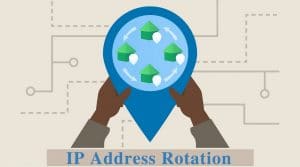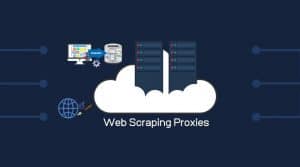Are you finding it difficult to differentiate between IPv4 and IPv6 proxies? You are not alone, as a good number of people can’t really tell their differences. In the article below, I took it upon myself to explain the differences in a simplified form for you to understand so as to know which to pick.
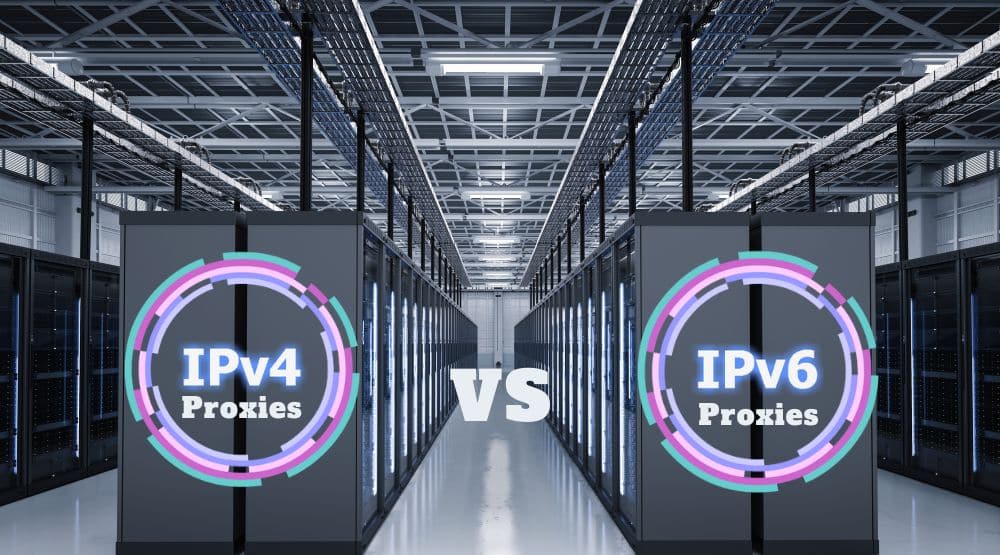
IPv4 Proxies Vs. IPv6 Proxies (Overview)
| Criteria | IPv4 Proxies | IPv6 Proxies |
|---|---|---|
| Compatibility | IPv4 proxies only work with IPv4 devices. Most websites and applications are compatible with IPv4 proxies. | IPv6 proxies can work with both IPv4 and IPv6 devices. However, not all websites and applications are yet fully compatible with IPv6. |
| Address Space | IPv4 has around 4.3 billion unique IP addresses. | IPv6 has around 340 undecillion unique IP addresses. This significantly larger pool makes it ideal for internet-connected devices. |
| Security | IPv4 proxies can provide a good level of security when properly configured and used with encryption features. | IPv6 proxies are considered more secure due to the built-in security features of the IPv6 protocol. |
| Performance | IPv4 has robust and reliable performance. | IPv6 is not noticeably faster than IPv4. However, the transition from IPv4 to IPv6 can sometimes cause latency, slowing down the browsing experience. |
| Adoption | Currently, IPv4 is still the dominant IP version in use. | The adoption of IPv6 is steadily increasing, but it is not yet universal. |
| Anonymity | Due to the smaller pool of IPs and wider use, IPv4 provides less anonymity compared to IPv6. | IPv6 offers better anonymity due to the vast pool of IP addresses, which makes the traffic harder to trace back. |
| Block Resistance | IPv4 proxies can be easier to block due to the limited number of IP addresses. | With an almost infinite number of IP addresses, IPv6 proxies are more resistant to being blocked. |
| Use Cases | IPv4 proxies are widely used in web scraping, social media promotion, multi-account management, and sneaker copping. | IPv6 proxies can be used in the same scenarios but might face compatibility issues with some websites and applications. |
The Internet Protocol (IP) has come a long way — and we are currently at version 6 (IPv6). The first 3 versions were made for testing purposes, and that is why IPv4 is what the Internet is built upon. The problem here is that IPv6 is not compatible with IPv4, which makes things a bit complex. This complexity is not just found when discussing networking. This is also found in the proxy realm.
It is not uncommon for you to go to a proxy provider and see that it offers IPv4 and IPv6 proxies. IPv6 is many times cheaper than IPv4, but many use cases will still require you to make use of IPv4. So what are the major differences between IPv4 and IPv6, and why can’t one use anyone he wants to? I will discuss the differences between them in this article.
Overview of IPv4 and IPv6 Proxies
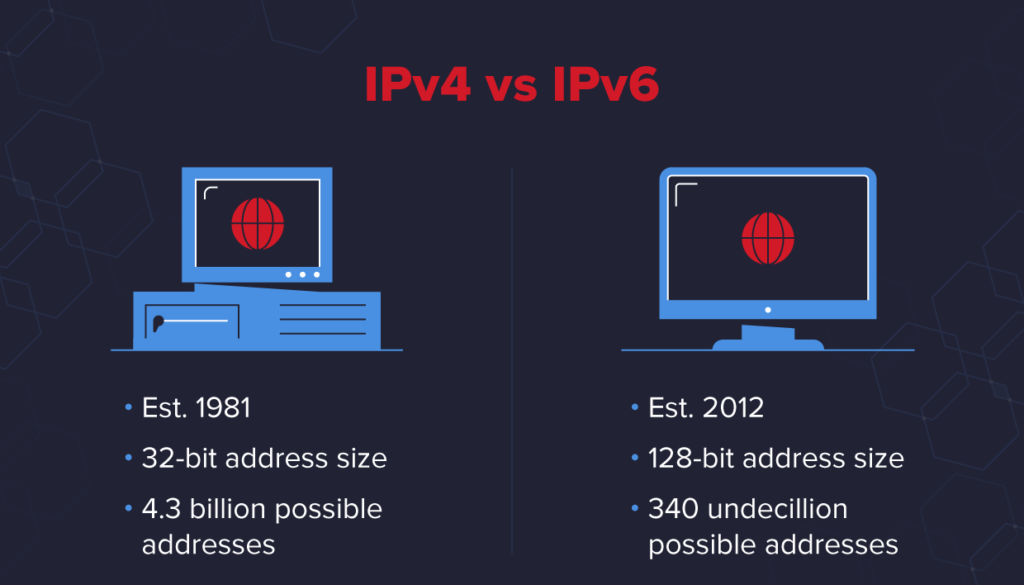
From the name of the two proxy types, you can tell what forms the basis of their differences — the IP version. The IPv4 proxies are the most common types of proxies and are the types built on the IPv4 protocol. In most cases, when providers don’t mention the protocol supported by their service, they just know that they only got support for IPv4. There is no need to explicitly mention it since it is the de facto protocol of the web. On the other hand, IPv6 proxies are the proxies that make use of the newer version of Internet protocol (IPv6). For this type, providers will explicitly tell you they have got support for IPv6 proxies.
If they don’t and they are sold to you, there is every chance they wouldn’t work for your use case, and you will return to them. There are websites where you can use both IPv4 and IPv6 proxies with no issues. However, the majority of websites currently run on IPv4. Aside from the IP version, some of their other differences include their structure, availability, security, cost, adoption, and site support, Susceptibility to ban, and many others. All of these will be discussed in their separate headings.
Structure of IPv4 Vs IPv6 Proxies
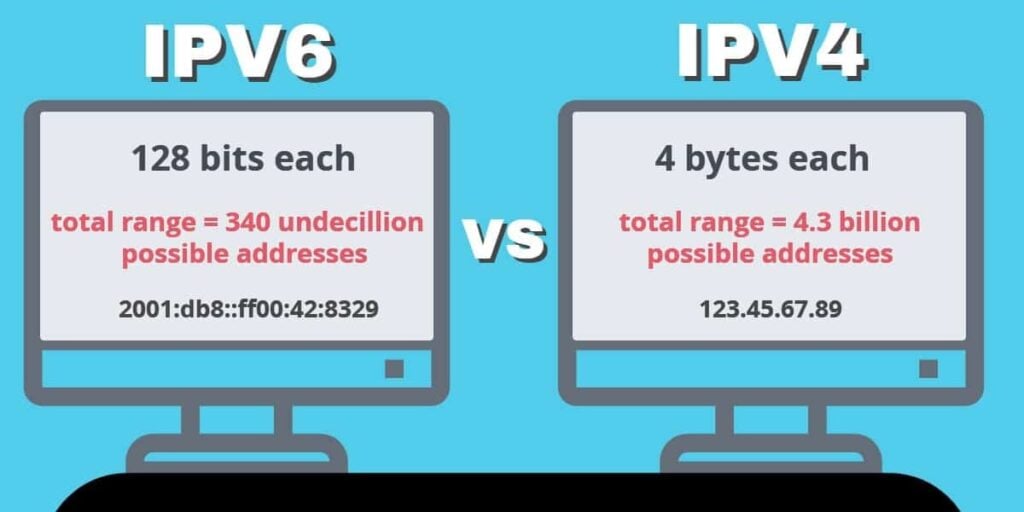
This might not be obvious in some cases. However, in most cases, you can tell an IPv4 proxy from IPv6 proxies by just looking at the IP address. IPv4 proxies are written in dot-decimal — some will simply call it written in numerical form. Something like (173.25.251.3). One thing to note about the IPv4 IPs is that they are in 32-bit.
The IP comes in 4 parts, differentiated by dots or decimals. In the case of IPv6 proxies, the IP addresses are not written like that. They are made available in hexadecimal forms, such as 2001:0db8:85a3:0000:0000:8a2e:0370:7334. This is a 128-bit IP address and is written in alphanumeric values.
The reason I said this might not be obvious is that some proxy providers provide you proxy host or address in a domain form rather than with their actual IP address.
This will make it difficult for you to pick at first. However, this is not a problem. If you are in doubt because of this, you can simply make use of a domain lookup tool like IPinfo.io to check the actual IP address it resolves to. This will bring out the real structure of the IP, making it possible to tell whether it is an IPv4 or IPv6 IP address.
Availability of IPs
One aspect IPv4 proxies differ from IPv6 proxies is their lack of abundance. And this didn’t originate from the proxy market — it has its attachment from the actual IPv4 and IPv6 technology. You see, there are only 4.3 billion IPv4 IP addresses that are available — and a large block of them have been reserved for special use cases, making those unavailable for public use.
It is, for this reason, we normally mention on this blog that any provider that claims to offer you virgin IPs is a fraud, except he wants to offer you IPv6 IPs. This is because there is little chance for one to get just one IPv4 IP that has not been used — and certainly not a proxy provider.
On the other hand, the number of IPv6 IP addresses available is 340 trillion trillion trillion. This is a large number that we most likely would never use. Unlike in the case of IPv4 IPs, there are no virgin IPs, in IPv6, there are more virgin IPs, those that have not been used, in an overwhelming percentage than those that have been used.
This is the reason proxy providers can provide as many IPv6 proxies as they like if the demand is there compared to IPv4 proxies. And this goes a long way to determine their price differences too.
Types of Proxies You Can Get IPv4 and IPv6 IPs
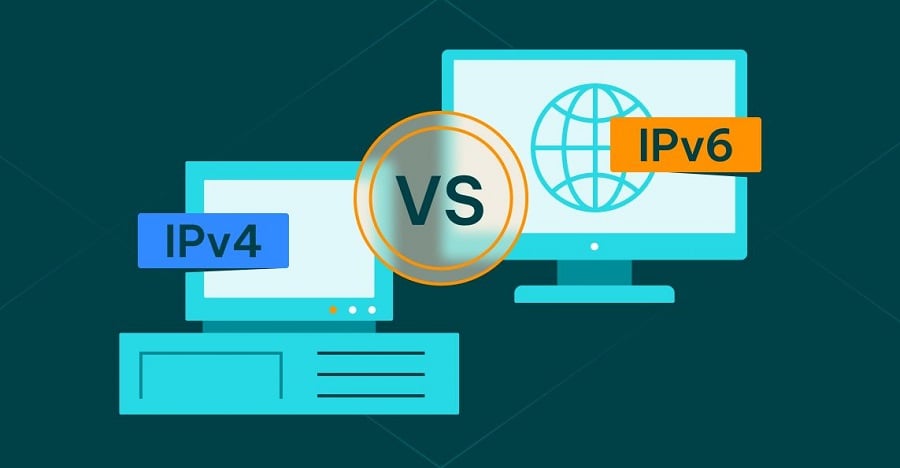
One interesting thing about the differences between IPv4 and IPv6 proxies is that there is even a difference in the type of proxies you can get both. Hypothetically, you can get both in all of types of proxies — datacenter, residential, ISP, and mobile. However, in reality, this is not the case, especially if you have your eyes on top providers that really work.
The IPv4 proxies are everywhere you go — datacenter proxies, residential proxies, mobile proxies, and ISP proxies. Even providers that have the name “V6” in their name to suggest they offer IPv6 proxies still offer IPv4 proxies. This is because of the demand for them, and no one wants to lose out.
On the other hand, for IPv6 proxies, you can only get them in the datacenter proxy type. In fact, when a provider mentions they offer IPv6 proxies, you can be sure the proxies they are talking about are datacenter proxies.
It is possible for you to get a few residential proxies as IPv6 proxies. But you will have to do a lot of digging in Internet marketing forums such as BlackHatWorld. Even at that, there is no guarantee you will find a credible provider you can trust.
Adoption and Site Support
This is one of the key differences and also the most important one — you wouldn’t purchase the proxies you can’t use for your site. It is important you know that IPv4 is the foundation of the Internet and the one on which the Internet is built. Most websites, including the popular ones, are built on and with IPv4 in mind.
Your regular ISP provider, hosting, and websites all use IPv4. Even though IPv6 does have its importance and strengths because of its abundance and advanced features, porting has not yet happened for most — even after over 10 years of its launch. It is important for you to know that most websites you will want to use proxies on only support IPv4 proxies.
A study was conducted and discovered that 71 percent of the top 500 websites on Alexa don’t support IPv6 proxies. The top 500 list contains the most popular websites on the Internet. The likes of Amazon, Reddit, Yelp, and even Twitter don’t support IPv6 IPs yet. And as such, you can’t use IPv6 proxies on them. Facebook and Microsoft are some of the top websites that do support IPv6, and as such, you can use IPv6 proxies. There is currently no top website that only supports IPv6 proxies.
Susceptibility to Ban
I will tell you this straight up, IPv4 proxies are more likely to withstand abuse without getting banned compared to IPv6 proxies. And there are reasons for that. You see, as mentioned earlier, most of the websites online do not support IPv6 IP addresses. Most Internet Service Providers (ISP) including Mobile Network Operators (MNOs) also do not provide them. This makes them alien to a number of anti-spam systems. Some ISPs have devices as a means to walk around the compatibility issues of IPv6 with IPv4 systems — but they wouldn’t help you too.
So far, the IPs are identified as IPv6, even if they are allowed to access sites that don’t support them by default, it will only take a small abuse of them before the IP is blocked. One unfortunate thing about banning IPv6 IP is that a website, in many cases, will not only ban an IP, if it notices something fish about a few IPs from an IPv6 subnet, it will ban all of the IPs in that subnet. If you intend to make use of IPv6 proxies for your task, you are better off buying from a provider that will provide you with these IPs from multiple subnets to protect you from this kind of ban.
Pricing and Cost of IPv4 Vs. IPv6 Proxies
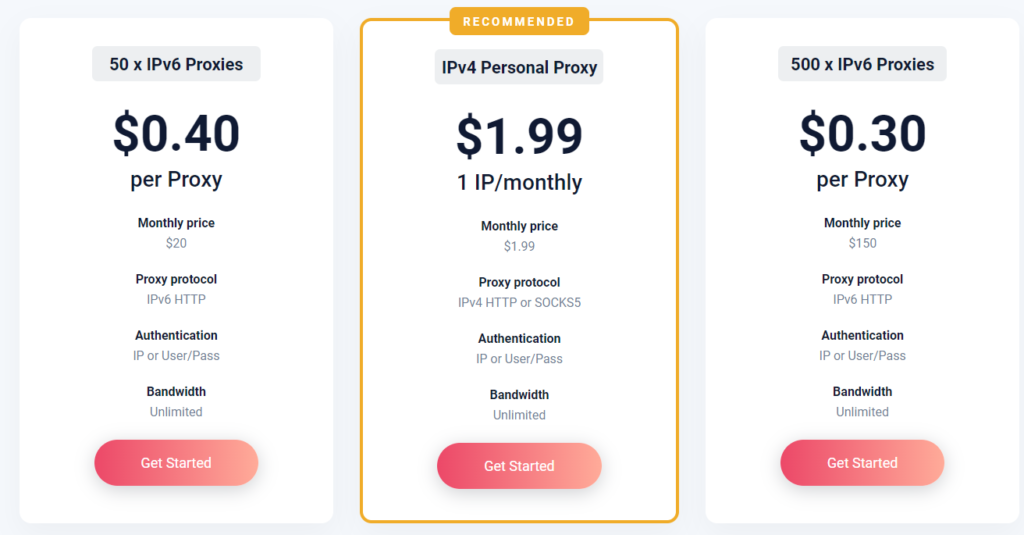
Another area you can differentiate IPv4 proxies from IPv6 proxies is in the area of pricing. It might interest you to know that IPv6 proxies are many times cheaper than IPv4 proxies. This I say after researching and reviewing many proxy providers and their proxies. Even for providers that offer both IPv4 and IPv6 proxies, you will find the IPv6 proxies are cheaper than IPv4 proxies. Take, for instance, Proxy-Seller. This provider offers some of the best proxies out there. It offers both proxies, but while a private IPv4 IP costs $2.14 monthly, a private IPv6 IP costs just $0.16 monthly.
Just in case you are wondering why the difference in pricing, it is the case of a mixture of available, demand, and supply, as well as other factors. While IPv6 IP addresses are more in number, their demand is extremely low. On the other hand, IPv6 is limited in number but is high on demand. There is also the issue of IPv6 being easily blocked and banned compared to IPv4 IPs, which makes them quite cheaper too.
Security Difference Between IPv4 and IPv6
This is more from the IP layer. In this case, I will give it to IPv6 proxies compared to IPv4 proxies. This is because the IPv6 technology was built with security in mind, and when implemented correctly, you can be sure of being more secure compared to using IPv4 proxies. IPv4 is known not to be sure, and the IPv6 technology built on that ensures it is made to be secure. The end-to-end encryption that was added later to the IPv4 was added from the beginning in the IPv6. It might interest you to know that the integrity checks and encryption you get in VPN software that make them secure comes by default in IPv6.
This is one of the things that makes VPN better at security than proxies (IPv4), and IPv6 comes with it. IPv6 security is based on IP Security (IPSec) which is a series of IETF security protocols that promote authentication, security, and data integrity. While IPv6 proxies can be generally more secure than IPv4 proxies, you need to know that the provider you buy from is important. These proxies are only secure if the provider implements the security correctly.
Why Hasn’t the Internet Ported to IPv6 Yet?
While this is about proxies, it is still important I talk about this for you to have an idea of what is going on. You see, the Internet is built on IPv4, and most of the systems and subsystems are all built on it and for it. Even though IPv6 is more promising with better security, speed, and abundance in terms of number, the Internet and most websites and systems on it are not ready yet. This is because doing so will render a good number of systems to fail. The IPv6, for some reason, has been built not to be compatible with IPv4.
While there are walk around to this, the bulk of the Internet is not ready for that yet — only a small fragment of it, most of which are being extremely careful. Porting will cause some systems to break, and we are not ready for that yet. While the majority of systems, including some legacy systems, will eventually migrate to IPv6 in the future, this remains only as a possibility, and the efforts to do so aren’t loud enough yet.
Which to Choose: IPv4 Vs. IPv6 Proxies?
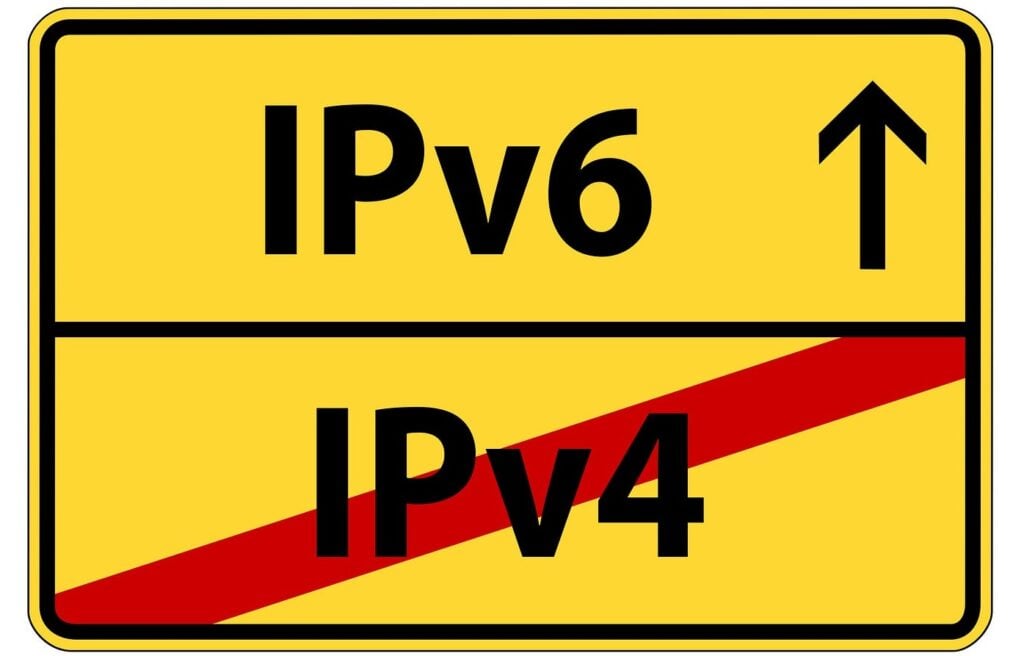
Since the question is not on IPv4 Vs. IPv6 technology but on proxies, then you shouldn’t even be asking this question in the first place. This is because most software and websites note the version they are compatible with. If any software you need proxies for doesn’t specify whether it supports IPv4 or IPv6 proxies, then the default is IPv4 proxy, and that is what it supports — you can speak to their support team, though, to be sure.
If you are developing a network application and you are skilled enough, I expect youth already know what you need for that. But for those that need proxies, then except software or your target website supports IPv6, you are better off using IPv4 and avoid some of the walk-around methods. But for software and systems that work with IPv6, you should use IPv6 proxies for them.
Conclusion
Looking at the above differences between IPv4 and IPv6 proxies, you can tell that you really do not have the choice yet in most cases — the system and task decide for you.
While IPv6 is the more advanced, notably because of its performance, security, and abundance, its usage is still far behind. And so far, you are going to be accessing websites n the Internet, your choice is quite limited. Except you are explicitly told the task can be done with IPv6, the default and best for you to use are IPv4 proxies.



